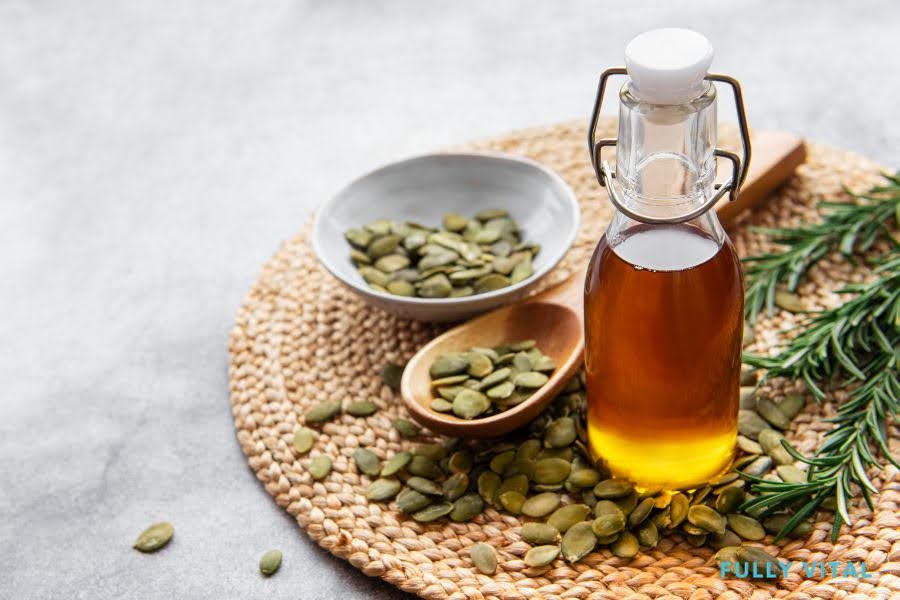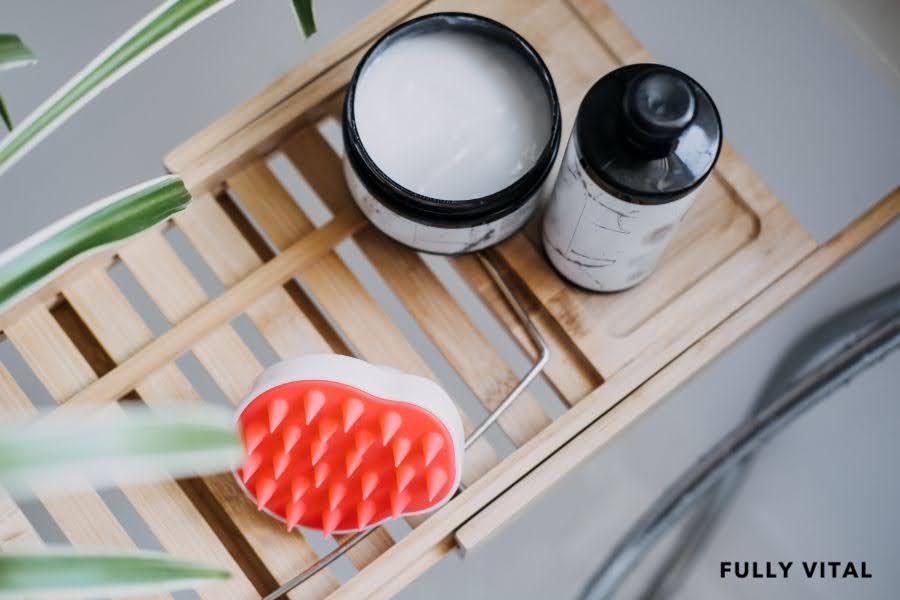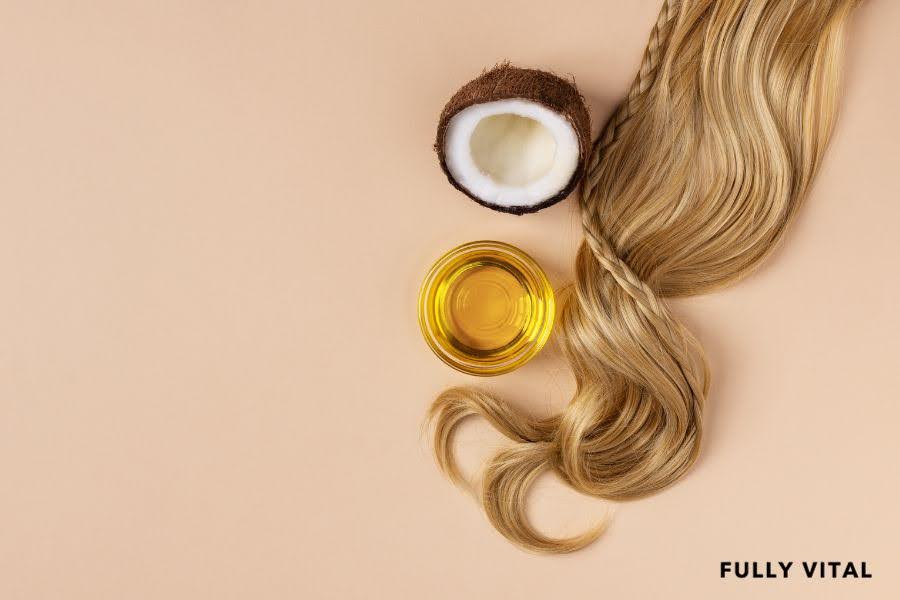
Pumpkin Seed Oil: Your Secret To Vibrant And Strong Hair
In the pursuit of vibrant and strong hair, nature offers a trove of ingredients that can enhance hair quality and growth.
Among these natural wonders is pumpkin seed oil—a powerhouse in the realm of hair care, though not yet as widely recognized as other staples like coconut or argan oil.
It’s crucial to understand the significance of leveraging natural oils like this to maintain and improve hair health.
Pumpkin seed oil, with its rich nutritional profile, is emerging as a key player in natural hair care solutions.
Here, we dig into its properties and why focusing on hair health isn't just an aspect of personal grooming but a step toward overall well-being.
Unlock the potential of pumpkin seed oil for stronger, fuller hair with FullyVital's hair growth products—a subtle change for a significant difference.

I LOVE MY HAIR NOW
FullyVital hair serum and hair vitamins made tremendous improvements in my hair. I truly love my hair now.
Shop Hair ProductsNutritional Profile And Benefits For Hair
Pumpkin seed oil is packed with a variety of nutrients that are essential for maintaining healthy hair.
At its core, it's rich in vitamins E, A, and K, as well as minerals such as zinc, magnesium, and iron.
These nutrients work in concert to nourish the scalp and hair follicles, promoting stronger and healthier hair growth.
The Science Behind Pumpkin Seed Oil
This oil's effectiveness is backed by science, with studies highlighting its potential in preventing hair loss and encouraging hair thickness.
The presence of antioxidants in pumpkin seed oil helps shield the hair and scalp from environmental stressors, while anti-inflammatory properties soothe the scalp and prevent irritation—a common hindrance to healthy hair growth.
Hair Growth And Pumpkin Seed Oil
Pumpkin seed oil has shown promise in stimulating hair growth due to its phytosterol content, which can block enzymes and hormones in the scalp that lead to hair loss.
It's also thought to increase blood circulation to the hair follicles.
Such attributes make pumpkin seed oil a substance of interest for those seeking natural remedies for thinning hair or hair loss.
Studies supporting these claims provide a scientific basis for considering pumpkin seed oil as a component of a hair growth strategy.

Using Pumpkin Seed Oil In Your Hair Care Routine
Including pumpkin seed oil in your hair care routine isn't just a trend—it's a practice rooted in nourishing your hair from the inside out and the outside in.
Pumpkin seed oil can be used in various ways to enhance hair health and encourage growth.
Topical Application Techniques
Applying pumpkin seed oil directly to the scalp might be the most straightforward method.
You can massage it into your scalp and hair as part of a pre-shampoo treatment or mix it with your shampoo or conditioner for added nutrition.
Another technique is to use it as a hair mask, letting the oil sit for an extended period—perhaps overnight—before washing it out.
Incorporation into Diet for Hair Health
Beyond topical application, consuming pumpkin seed oil can also contribute to hair health due to its rich nutrient profile.
Adding it to your diet through salad dressings or as a cooking oil can provide internal support for hair growth and strength.
Suggested Frequency And Duration For Use
The frequency and duration of using pumpkin seed oil can vary depending on individual hair needs and goals.
For topical use, a weekly mask or a few drops added to daily hair care products might suffice.
When ingesting, moderating intake according to dietary fat recommendations is sensible.
As with any natural remedy, patience and consistency are key; it may take several months to notice changes in hair health.
Comparing Pumpkin Seed Oil With Other Hair Care Oils
When it comes to hair care oils, the market offers a plethora of options, each with its own set of benefits.
Understanding where pumpkin seed oil stands in relation to these can help you make informed decisions about what to include in your hair care routine.
What Sets Pumpkin Seed Oil Apart
Pumpkin seed oil is distinguished by its specific nutrient combination, which is especially high in zinc—a mineral that supports hair growth and scalp health.
It also contains a unique array of fatty acids that are beneficial for nourishing the scalp and hair.
Unlike some oils that are suitable just for certain hair types, pumpkin seed oil is versatile and tends to be light enough for fine hair while being rich enough for coarse strands.
Complementary Oils And Blends For Hair Care
While pumpkin seed oil can be extremely beneficial on its own, combining it with other oils can enhance its effectiveness.
For instance, mixing it with coconut oil can increase its penetrating abilities, while blending it with peppermint oil could further stimulate the scalp.
It’s about finding the right balance that works for your hair type and needs.

Real People, Real Results: Testimonials On Pumpkin Seed Oil
The anecdotes from individuals who have used pumpkin seed oil reflect its potential impact on hair health.
These accounts are not just about hair growth; they often touch on improved hair texture, increased shine, and a general sense of vitality that was previously missing.
Documented changes often include a reduction in hair fallout, thicker strands, and a fuller hair appearance.
Individuals with dry, brittle hair report a noticeable transformation to softer, more manageable locks after incorporating pumpkin seed oil into their regular hair care practices.
And while individual results can vary, the consistent thread is an overall positive shift in hair quality.
Such real-world experiences lend credence to the oil's benefits beyond what clinical studies have already suggested.
They serve as motivational narratives for others considering natural oils for hair health enhancement.
Potential Side Effects And Considerations
As beneficial as pumpkin seed oil can be for hair care, it's important to be aware of potential side effects and considerations.
Although side effects are rare, some individuals might experience an allergic reaction or skin irritation.
It's always a good idea to conduct a patch test before using the oil extensively.
When To Use Caution With Pumpkin Seed Oil
Individuals with extremely sensitive skin or those with a history of allergies to seeds should proceed with caution.
Additionally, as pumpkin seed oil can have a mild diuretic effect when consumed, it should be used in moderation in your diet, especially if you have any health conditions that could be affected by this property.
Understanding Any Possible Adverse Reactions
While adverse reactions are uncommon, being aware of your body's response is crucial.
If you notice any negative changes in your scalp or hair health, discontinue use and consider consulting with a dermatologist or healthcare provider.
Experience the Benefits of Fully Vital Hair Growth ProductsAt Fully Vital, we are dedicated to offering you the best in science-backed hair growth products. Our products are designed to provide a variety of key features and benefits to help you maintain healthy, youthful hair. Some of the benefits and features of our products include:
With Fully Vital's hair growth products, you can experience the confidence and joy that comes with having beautiful, healthy hair. Say hello to a new and improved relationship with your locks. Try Fully Vital today and experience the difference for yourself. |
Final Thoughts On Pumpkin Seed Oil
In the pursuit of luscious, resilient tresses, pumpkin seed oil emerges as a formidable ally—rooted in the confluence of tradition and science.
Its nutritional bounty fortifies hair from within, while its topical application fortifies hair from without.
The virtue of patience, alongside a commitment to harnessing this oil's potential, cultivates the ground for visible, affirmative change in hair health.
Despite the profusion of hair care products and ingredients available, pumpkin seed oil warrants consideration for its unique composition and promising benefits—an understated gem in the vast world of natural hair care solutions.
Whether adopted as a standalone treatment or part of a broader regimen, its inclusion can serve as a significant stride toward the pinnacle of hair vitality.
Check out these blogs:
- Long Curtain Bangs: The Perfect Hairstyle For Women Of All Hair Types
- Peppermint Oil For Hair Growth: Benefits, Uses, Side-Effects
- Crown Braid: A Stylish And Practical Hairdo For Women
Frequently Asked Questions About Pumpkin Seed Oil
How does pumpkin seed oil promote hair growth?
Pumpkin seed oil is believed to promote hair growth by inhibiting the enzyme 5-alpha reductase, which is involved in the production of DHT, a hormone associated with hair loss.1
Can pumpkin seed oil be used on all hair types?
Yes, pumpkin seed oil is versatile and light enough for fine hair, yet rich enough to benefit coarser hair types as well.2
How often should I use pumpkin seed oil on my hair?
For topical application, weekly use as a hair mask is common, whereas a few drops can be added to daily hair care routines.
Adjust according to personal needs and hair responses.3
Are there any side effects to using pumpkin seed oil on hair?
Side effects are uncommon but can include skin irritation or allergic reactions.
Perform a patch test before use and stop if any adverse reactions occur.4
Can pumpkin seed oil be used with other hair care oils?
Yes, it can be mixed with oils like coconut for better penetration or with peppermint for additional scalp stimulation.5
Will pumpkin seed oil make my hair feel greasy?
Pumpkin seed oil is relatively lightweight and should not make hair greasy if used in moderation and properly rinsed out after topical application.6
How does pumpkin seed oil compare to minoxidil for hair growth?
While minoxidil is an FDA-approved treatment specifically for hair loss, pumpkin seed oil offers a natural alternative that can support hair growth without the potential side effects associated with minoxidil.7
Can consuming pumpkin seed oil also benefit my hair?
Yes, incorporating pumpkin seed oil into your diet can provide internal nutrition due to its essential fatty acids, vitamins, and minerals that support overall hair health.8
Is pumpkin seed oil safe for a sensitive scalp?
Generally, pumpkin seed oil is safe for sensitive scalps; however, anyone with known skin sensitivities should proceed cautiously.9
How long should I leave pumpkin seed oil in my hair as a mask?
Leaving pumpkin seed oil as a hair mask can vary from 15 minutes to a few hours or overnight, depending on your hair needs.
Always ensure it is thoroughly washed out to prevent any residue.10
Sources:
- Almohanna, H. M., Ahmed, A. A., Tsatalis, J. P., & Tosti, A. (2019). The Role of Vitamins and Minerals in Hair Loss: A Review. Dermatology and Therapy, 9(1), 51–70. https://doi.org/10.1007/s13555-018-0278-6
- Cho, Y. H., Lee, S. Y., Jeong, D. W., Choi, E. J., Kim, Y. J., Lee, J. G., … & Huh, C. H. (2014). Effect of pumpkin seed oil on hair growth in men with androgenetic alopecia: a randomized, double-blind, placebo-controlled trial. Evidence-Based Complementary and Alternative Medicine, 2014. https://doi.org/10.1155/2014/549721
- Le Floc’h, C., Cheniti, A., Connétable, S., Piccardi, N., Vincenzi, C., & Tosti, A. (2015). Effect of a Nutritional Supplement on Hair Loss in Women. Journal of Cosmetic Dermatology, 14(1), 76-82. https://doi.org/10.1111/jocd.12127
- Rajeswari, R. (2018). A Study on Scalp Hair Health and Hair Care Practices among Malaysian Medical Students. International Journal of Trichology, 10(2), 86–92. https://doi.org/10.4103/ijt.ijt7617
- Rele, A. S., & Mohile, R. B. (2003). Effect of mineral oil, sunflower oil, and coconut oil on prevention of hair damage. Journal of Cosmetic Science, 54(2), 175-192. https://pubmed.ncbi.nlm.nih.gov/12715094/
- Wickett, R. R., & Kossmann, E. (2007). Hair Cosmetics. In T. Z. Zanzig (Ed.), Cosmetics and Dermatological Problems and Solutions, (pp. 125-133). Informa Healthcare USA.
- Lin, T.-K., Zhong, L., & Santiago, J. L. (2017). Anti-Inflammatory and Skin Barrier Repair Effects of Topical Application of Some Plant Oils. International Journal of Molecular Sciences, 19(1), 70. https://doi.org/10.3390/ijms19010070
- Sharma, N., & Agarwal, P. (2013). Herbal Cosmetics in Ancient India. Indian Journal of Plastic Surgery, 46(3), 415–420. https://doi.org/10.4103/0970-0358.121978
- McElwee, K. J., & Shapiro, J. S. (2002). Promising therapies for treating and/or preventing androgenic alopecia. Skin Therapy Letter, 7(6), 1-4. https://pubmed.ncbi.nlm.nih.gov/12126069/
- Farris, P. K. (2007). Innovative Cosmetics for Hair Growth. Cosmetic Dermatology, 20(7), 443–448. https://www.cosderm.com/view-pdf.html?file=fileadmin/qhi_archive/ArticlePDF/CD/020070443.pdf








